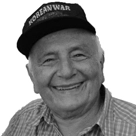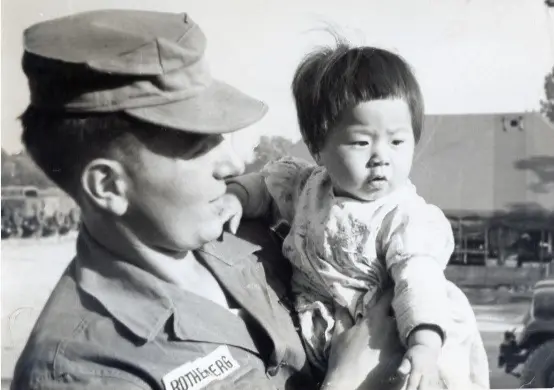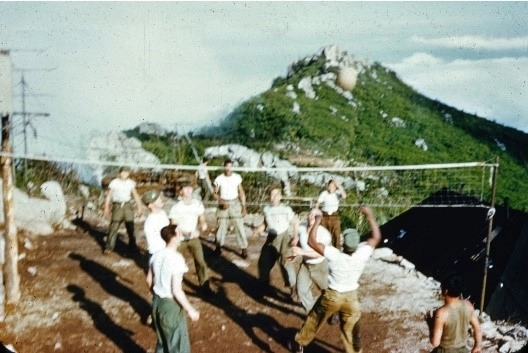한국전쟁 징집 1년간 한국 머물러
그 당시 어린소년 유독 기억 남아
영어 배우며 돈 버는 모습 인상적
전쟁이후 어떻게 자랐는지 궁금해
희망 엿보게 해준 소년 만나고파

나는 뉴욕 출생의 미국인이다. 고등학교를 졸업한 후 텔레비전 수리공으로 일했는데, 한국전쟁에 징집돼 1954년부터 1955년까지 한국에 머물렀다. 배를 타고 일본에 들렀다가 부산에 도착했고 다시 기차를 이용해 서울로, 또 다시 트럭을 타고 설악산으로 향했다. 설악산에 위치한 중계소에서 내륙과 해안간 메시지를 전달하거나 라디오를 수리하는 게 내 임무였다. 당시 한국 군인들에게 무전기를 사용하는 방법도 알려줬다.
전쟁이 일어난 한국은 가난했다. 작은 오두막집과 판잣집들이 매우 많았다. 내가 복무했던 캠프 근처 마을도 군용 상자와 짚으로 만든 집들로 이뤄져 있었다. 하수시설도 변변치 않아 마을에선 항상 냄새가 났다. 그럼에도 한국은 아름다웠다. 가난과 추위에 시달리면서도 한국 사람들은 마을 한가운데에 색색의 꽃을 심었다. 기차를 타고 서울로 이동할 땐 막 벼가 자라기 시작한 논들이 펼쳐졌는데 마치 패치워크 퀼트 같았다. 베트남 전쟁 당시엔 현지 주민들이 미군에게 적대적이었지만 한국에선 그런 느낌을 받은 적이 없었다. 낯선 미군에 두려움을 가졌을 수도 있었겠지만 적어도 한국의 민간인들은 친절했다.

한국에서 만난 이들 중 유독 기억에 남는 소년이 있다. 9살 정도였다. 정확한 이름을 알지는 못했지만 ‘김’이라고 불렀다. 한국전쟁 중 김의 부모가 숨져 그는 한 성당에서 운영하는 서울의 고아원에 맡겨졌다. 김은 고아원 생활을 좋아하지 않았다. 그래서 가끔 고아원에서 나와 나와 내 동료들이 머무르던 캠프로 왔다. 당시 대부분의 한국인들은 영어를 하지 못해 그들과 깊은 소통을 할 수 없었다. 그러나 김은 캠프에 와서 영어를 배웠다. 얼마 지나지 않아 미국 군인들과 소통하면서 숙식을 해결했다. 동료들도 김을 좋아했다. 김이 요청하면 함께 자고 가도록 했다. 매우 호감이 가는 소년이었다. 언젠가부터 김은 미군들에게 자신이 가지고 있던 한국 돈을 미국 돈으로 바꿔달라고 했다. 김이 왜 돈을 바꿔가는지 궁금했다. 그러다 이유를 깨달았다. 그렇게 캠프에서 바꿔간 미국 돈을 다시 (시내 등에서) 한국 돈으로 바꾸며 환차익을 얻고 있던 것이다. 어린 소년이 영어를 배우고 돈을 버는 모습이 매우 흥미로웠다.
전란의 시대, 한국의 소년들은 미군 부대에서 각종 잡일을 하는 ‘하우스 보이’로 일하거나 암거래 등에 내몰렸다. 암시장의 소년들이 재빠르게 물건을 받고 돈을 건네는 모습이 매우 매끄러워 그런 소년들을 ‘슬릭(Slick·매끄러운) 보이’로 지칭하기도 했다. 김은 하우스 보이나 슬릭 보이가 되기엔 너무 어렸지만 그럼에도 자신만의 방식으로 돈을 벌었다. 그런 모습이 정말 인상적이었다.

김과 같은 사람들을 만나면서 한국은 매우 빠르게 성장할 것이라는 느낌을 받았다. 전쟁 중이었던 한국은 가난했고 많은 사람들이 문맹이었다. 그런데 그 와중에도 김처럼 영어를 배우는 사람들을 볼 수 있었다. 교육에 대한 열망도 컸다. 당시엔 문맹률이 높았지만 전쟁 이후엔 그 높은 교육열로 큰 변화가 있을 것이라고 생각했다. 미국으로 돌아온 후 부모님에게도 한국에 대한 감상을 그렇게 전했다. 그리고 실제로 전쟁 전후 최빈국이었던 한국은 이제 전세계적으로 손 꼽히는 경제 대국으로 거듭났다.
전쟁 이후 급격히 발전한 한국에서 김이 어떻게 자랐는지 궁금하다. 아마도 지금은 김도 75세 정도가 됐을 것이다. 어린 시절 그가 보여준 모습을 떠올려보면 아주 유명한 은행가가 되기에 충분했을 것으로 생각한다. 한국에서의 시간, 당시 한국전쟁에 참여했던 경험은 내 인생에서 정말 중요한 시간이었다. 전쟁이 끝난 이후에도 한국을 몇 차례 방문했고 설악산도 다시 갔었다. 그럴수록 그 때 만난 어린 소년, 김이 궁금했다. 한국의 발전이 매우 기쁘다. 그리고 전쟁이라는 비참한 상황 속에서도 발전의 희망을 엿보게 해줬던 김을 만나고 싶다. 그 때 그 소년을 꼭 찾고 싶다.
※영문 원본
I am an American, born in New York City. After finishing high school, I worked as a television repairman. However, I was drafted into the Korean War and served in Korea from during 1954 and 1955. I traveled to Korea by troopship, arriving in Busan, after stopping briefly in Japan. I was then put on a train to Seoul. From Seoul, I traveled by truck and Jeep to a mountain pass that allowed me to climb to the peak of Mt. Seorak. My task was to be to allow the exchange of inland and coastal messages by maintaining the radio equipment at a relay station at the peak of Seorak Mountain. At the time, I also taught Korean soldiers how to use the communication equipment.
Korea, which had been devastated by war, was very poor. There were many small huts and makeshift homes. The small houses in the village near the camp where I stayed when I came down from Soeraksen were made from discarded military crates, with roofs of straw. There was only a rudimentary sewage system, so the village always had a foul smell. But despite the poverty, Korea was beautiful. Even in the cold, Koreans planted colorful flowers in the middle of their villages. When I took the train from Busan to Seoul, the rice fields had just started to grow and spread out like a many colored patchwork quilt.
During the Vietnam War, local residents were hostile toward the U.S. military, but I never felt that way in Korea. They might have been afraid of the strange U.S. soldiers, but the Korean civilians were always friendly.
Among the people I met in Korea, one boy stands out in my memory. He was about 9 years old. I didn’t know his name, so I called him “Kim.” Kim’s parents had died during the Korean War, and he had been sent to an orphanage in Seoul, run by a church. Kim didn’t like living in the orphanage, so sometimes he would leave and come to the camp in Seoul where my colleagues and I stayed. At that time, most Koreans didn’t speak English, so communication was difficult. But Kim came to the camp and learned English. Soon, he was able to communicate with the American soldiers and solve his problems related to accommodation and food. When Kim asked for it, we allowed him to sleep with us in our Quonset hut.. He was a very likable boy.
Very often, Kim asked us to exchange Korean money for American dollars. I wondered why he was exchanging money. Then I realized he was using the U.S. dollars to make a profit by changing them back into Korean won in the city and profiting on slight differences in the exchange rates. It was fascinating to see a young boy learning English on his own and finding inventive ways to make money.
During the war, many Korean boys were able to work as ’houseboys,‘ doing various chores for U.S. military units, or were involved in the black market. It was impressive to see how quickly these boys could get things and make money. Theboys operating in the black market were sometimes called “slickee” boys. Kim was too young to be a houseboy or a slickee boy, but he was still finding ways to earn money. That was very impressive to me.
When I met people like Kim, I felt certain that Korea would develop quickly. At that time, Korea was poor, and many people were illiterate. But I could see that people, like Kim, were learning English and striving to improve. The desire for education was strong. Although the illiteracy rate was high during the war, I believed that, after the war, Korea would see dramatic progress because of the strong enthusiasm for learning. After I returned to the United States, I shared my impressions of Korea with my friends and family and was not surprised that Korea, which was once one of the poorest countries, became one of the world’s leading economic powers.
I wonder how Kim has fared in the Korea that has developed so rapidly since the war. He is probably around 75 years old now. Thinking back to what he showed me as a child, I believe he could have become a very successful banker.
My time in Korea and my experiences during the Korean War were pivotal moments in my life. Even after the war, I visited Korea several times and even climbed Seoraksan again. The more I went, the more curious I became about Kim, the young boy I met back then. I am very happy to see Korea’s development, and I would love to meet Kim, the boy who gave me a glimpse of hope in the midst ofthe war’s misery. I truly would like to find that boy.
/마틴 루텐버그 前 한국전쟁 참전 미국 군인
<※외부인사의 글은 경인일보의 편집방향과 다를 수도 있습니다.>











